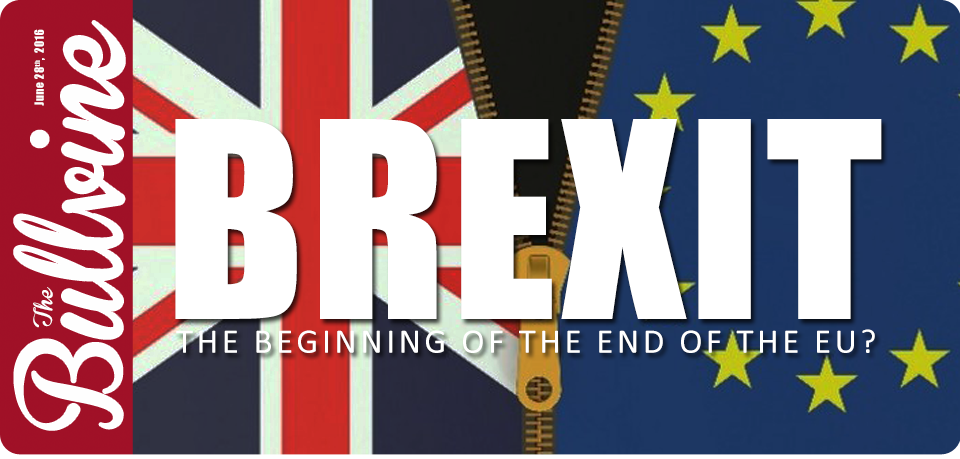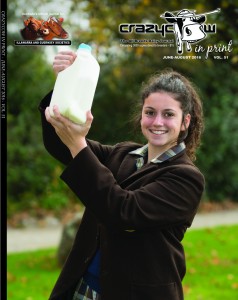
Bruce Jobson
The whys and wherefores of the UK’s EU referendum
At the end of June, the UK voted on whether or not to stay in the European Union (EU). CrazyCow’s Dianna Malcolm asked British dairy specialist Bruce Jobson — and CrazyCow’s own Europe correspondent — to explain the reasons for the referendum.
DM “How did the UK’s referendum on the EU come about?”
BJ “Many British people have had longterm concerns with regard to continued EU membership. During the 2015 general election, Prime Minister David Cameron stated that if his ruling Conservative Government was re-elected for a second term, he would hold a referendum — albeit after he had negotiated terms for a reformed agreement with the EU.
The negotiations took place earlier this year and Mr Cameron has recommended that the British electorate vote in favour of remaining in a ‘reformed’ EU.
“However, there is still uncertainty as to whether the EU will fully ratify the negotiations, and many opponents consider the reformed negotiations as ‘worthless’. Hence the campaign to leave — or ‘Brexit’, which is an abbreviation for ‘British exit’.”
LAWS FROM BELGIUM
DM “Why has this all happened?”
BJ “In 1951, the concept of a free-trade zone and better economic integration was discussed, and, in March 1957, a six-country alliance of Belgium, France, Italy, Luxembourg, the Netherlands and West Germany was established [by signing the “Treaty of Rome”] known as the Common Market. The creation was a rebuilding process in a pretty much bankrupt Europe, resulting in mutual benefits as well as having the aim of preventing any future wars between member states. In 1961, the UK applied to join this exclusive club but the application was rejected by France, fearing US back-door influence, but eventually, the UK joined in 1973, following a ratifying referendum.
“The economies of these northern European countries was similar and the club became a huge success with the Common Agricultural Policy, or CAP, being the most successful policy implementation. Since then, the Common Market has changed from an economic alliance to a more political alliance, resulting in an extended 28-member ‘federal state’ of 500 million, changing the name along the way to the ‘European Community’ to the present, ‘European Union’, or EU. Turkey, with a population of approximately 80 million, is the latest country aiming to become a full member. “Large sections of the British public now consider the ‘new’, extended EU is not the organisation that the country voted to join in 1973. British sovereignty and border control has been eroded, and 60% of all laws applicable to British subjects are created and passed by the EU Parliament in Brussels, which is also the capital of Belgium. Many of the laws are created by faceless and unelected EU bureaucrats, and the UK has little power to influence or change laws that are seen as benefitting other 27 member states and economies.”
CAN’T PROMOTE OWN MILK
DM “Surely, the UK will be better-off by remaining in the EU?”
BJ “That’s the £55 million question [A$109.3m]. The UK pays £55 million every day — or £350m [A$695.5m] per week — as its contribution to being an EU member. The UK receives approximately 60% back as a rebate. The UK does not have any control over how and where the rebate money is spent. This is decided by the EU.
“However, it is the rules and regulation that are seen as restricting our industries. For example, AHDB Dairy is funded by a producer levy on all British dairy farmers — yet the organisation is not allowed to promote British milk. [AHDB Dairy is a subsidiary of AHDB, or the Agriculture and Horticulture Development Board.]. EU rules prevent AHDB Dairy from promoting its own members’ produce as this is seen as unfair competition against other EU member states.
“The same applied recently to the steel industry, which has been going through a severe downturn in the UK and globally. The UK Government was powerless to step in to support or ‘nationalise’ the steel industry, and two massive steel plants were closed with the loss of thousands of jobs.
“There are tens of thousands of these laws governing our countryside, including the distance that houses are built from heathland [five kilometres] to prevent cats from chasing birds. The EU is viewed by many as being out-dated — and now built to keep power with the EU elites, and not the people.
“The regulations imposed on agriculture are staggering, although it has to be stated that some rules are beneficial, while others are considered to be downright ridiculous. EU farm payments are a concern, as many farmers view the subsidies as a ‘necessary evil’, but the ‘red tape’ and bureaucracy involved is immense, and can only be undertaken by paying professional land agents to complete the necessary paperwork.”
PEOPLE STRAIN
DM “How much does immigration play on the fear-factor of the British public?”
BJ “Immigration is becoming a huge part of the Brexit campaign. Under the Treaty of Rome, free movement is allowed between member states – and that remains a fundamental part of EU membership. The UK is the second-largest economy in Europe, behind Germany, and the sixth largest in the world. People from the other 27 EU countries are free to move to Britain to work under the Treaty of Rome.
“There are two issues here. First: legal immigration; and secondly: illegal immigration. Last year, in the 12 months ending September 2015, more than 530,000 migrants entered the UK — including 256,000 from the EU. Over the same 12-month period, 630,000 migrants received National Insurance registration numbers so they could work, and subsequently receive UK benefits – such as housing, health, social welfare payments, and so on. Net migration into the UK has been regularly running high — last year was 330,000 — for several years.
“The sheer volume of numbers is placing incredible strain on housing, education and the National Health Service, which is a free service. The UK cannot build enough houses, enough schools or enough hospitals to cope with the increases. In London schools, an estimated 60 languages are spoken and education services have to provide interpreters. It is estimated that due to immigration increases, the UK has to build a new house every seven minutes.
“The National Health Service is reported at breaking-point, and in some areas estimates state there are not enough local family doctors, and hospitals are unable to provide the required service owing to spiralling costs. The UK could build a new hospital every week if it did not have to contribute £55m each day to the EU!
“The ongoing EU migrant crisis is a huge concern, with over 1.83 million people illegally entering the EU last year — six times more than the previous year. More than 1.1 million migrants were welcomed by Germany alone last year; additionally, Germany is expecting 2.5 million migrants to arrive in the next five years.
“EU border checkpoints have been over-run, and concerns over terrorist infiltration is immense. Once registered, all will be entitled to an EU passport, and can therefore gain entry to the UK as part of the EU’s free movement of people policy under the Treaty of Rome. On that basis, there is nothing to stop 500,000 or one million people legally entering the UK on an annual basis.”
BREXIT TO BREAK EU?
DM “Will the EU be weakened if Brexit occurs?”
BJ “This is just my personal opinion: yes, I believe the EU will be weakened if the UK leaves. I consider the migrant crisis allied to a Brexit may, and I repeat, may, lead to the collapse of the EU in its present form. There is also the financial concern over the euro currency and Euro-zone. Britain maintained the pound sterling, as is not part of the failing currency union. The euro is in deep trouble and there may be another financial crisis similar to 2008.
“Financially, the euro currency is a potential future disaster area, with countries such as Spain having 55% unemployment in its population who are aged under 25.
“The Brexit campaigners want to be free of undemocratic EU centralist policy, passed by laws in Brussels, and pursue global markets in other countries such as Australia, Canada, China and USA and so one. Trade tariffs will have to be negotiated with these countries as well as within the EU, should the UK leave.
“It may seem confusing to Australians, where a points system determines immigration policy and effectively who can and cannot live and work in Australia. The old Common Market was originally similar to the 12-country Trans Pacific Partnership, or TPP — but with the free movement of people. [TPP members are: Australia, Brunei, Canada, Chile, Japan, Malaysia, Mexico, Peru, New Zealand, Singapore, the United States and Vietnam.]
“It’s not hard to imagine how Australians and Canadians would feel if 60% of their laws were made by unelected bureaucrats in a 12-country TPP parliament residing in another country? Or if the free movement was considered of millions of people to live and work in the USA from Mexico, Peru, Vietnam or Singapore?
“The USA would not allow 11 other countries to make 60% of its laws and overrule its democratically elected administration. Would Australia or the US open its border controls and allow unrestricted freedom of movement from the other 11 TPP countries without the need to produce a passport?
“One final point on security: the EU makes a strong play on the fact there have not been any wars — and is eager to bask in the acclaim. Since 1945, the security of Europe has been the responsibility of NATO, the North Atlantic Treaty Organisation, of which Britain is a member. But in fairness, the United States has backed and guaranteed the security and freedom of Europe for the past 70 years, and this has been underpinned by the US dollar.”
Check out more great articles like this in the latest edition of Crazy Cow In Print















Leave a Reply
You must be logged in to post a comment.